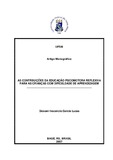| dc.contributor.advisor | Tonini, Andréa | |
| dc.creator | Lucas, Giovani Inocêncio Garcia | |
| dc.date.accessioned | 2017-01-02T11:11:01Z | |
| dc.date.available | 2017-01-02T11:11:01Z | |
| dc.date.issued | 2007 | |
| dc.date.submitted | 2007 | |
| dc.identifier.uri | http://repositorio.ufsm.br/handle/1/2456 | |
| dc.description | Artigo (especialização) - Universidade Federal de Santa Maria, Centro de Educação, Curso de Especialização em Educação Especial - Déficit Cognitivo e Educação de Surdos, EaD, RS, 2007. | por |
| dc.description.abstract | In this survey, some notions on the concepts of psychomotor education, psychomotor
functions, and children’s development are show and described by means of its
constitutive elements, to wit, co-ordination, bodily framework, lateral control
development, spatial structuring and temporal acknowledgement, as well as visual
and aural discrimination, taking all along into consideration the fact that every child
presents from birth a potential for development but that such a potencial will not
depend on organic maturation alone, but also upon its interaction qith other human
beings and the environment into which aforementioned children are inserted. It is
within same interaction that children set up their bodily self-image as an embasament
for their motor development and all sorts os further learning. Within this context, the
herein enclosed paper builds upon reflexions on how movement and psychomotor
education as rendered by reflexive practices can act over the learning process
incidences thoughout the identification of suchs movements’ relevance upon the lives
of children, as well as approaches such subjects as development, learning, and
psychomotor education. The methodology employed was that of a bibliographical
survey, a method that aims to undertand such theoretical information that can be
found on problem situations, because children are an extremely hard study target
and when we are focusing upon some variables of their symbolic learning we are
facing a research field whose conceptual boundaries are still unperfectly established
and a similar phenonomen happens, pearchance with even greater indefinition, when
we are intent into studyng such variables as presented by the acquisition of motor
skill, a set of praxes often mistaken and mixed up with psychomotricity itself. | eng |
| dc.language | por | por |
| dc.publisher | Universidade Federal de Santa Maria | por |
| dc.rights | Acesso Aberto | por |
| dc.subject | Desenvolvimento infantil | por |
| dc.subject | Movimento | por |
| dc.subject | Educação psicomotora | por |
| dc.subject | Aprendizagem | por |
| dc.title | As contribuições da educação psicomotora reflexiva para as crianças com dificuldade de aprendizagem | por |
| dc.title.alternative | The contributions of education psicomotora reflective for children difficulty of learning | eng |
| dc.type | Trabalho de Conclusão de Curso de Especialização | por |
| dc.degree.local | Polo de Bagé, RS, Brasil | por |
| dc.degree.specialization | Educação Especial - Déficit Cognitivo e Educação de Surdos, EaD | por |
| dc.description.resumo | No presente artigo, apresentam-se algumas noções que contemplam o conceito de
educação psicomotora, as funções psicomotoras e o desenvolvimento infantil,
descritos através dos seguintes aspectos: coordenação, esquema corporal,
lateralidade, estruturação espacial, estruturação temporal, discriminação visual e
auditiva, uma vez que, a partir do nascimento, a criança apresenta potencial para
desenvolver-se, porém este potencial não depende apenas da maturação orgânica
mas também da interação com o outro e meio na qual está inserida. É nesta
interação que ela organiza sua imagem corporal, é base de seu desenvolvimento
motor e de aprendizagem. Neste contexto, o presente trabalho traz uma reflexão
acerca de como o movimento e a educação psicomotora, através de uma prática
reflexiva, poderão atuar nas incidências do processo de aprendizagem,
identificando-se a relevância do movimento na vida destas crianças e abordando
temas como: desenvolvimento, aprendizagem e educação psicomotora. A
metodologia utilizada foi a da pesquisa bibliográfica, cujo método tem como objetivo
procurar compreender informações teóricas existentes sobre uma situaçãoproblema,
pois sendo a criança um objeto de estudo extremamente difícil, quando
investigamos algumas variáveis da sua aprendizagem simbólica, deparamo-nos com
uma área de pesquisa ainda conceitualmente pouco definida, o mesmo se
passando, talvez ainda com maiores indefinições, quando se pretende estudar as
variáveis da sua motricidade, freqüentemente confundida com a psicomotricidade. | por |
| dc.publisher.unidade | Centro de Educação | por |


